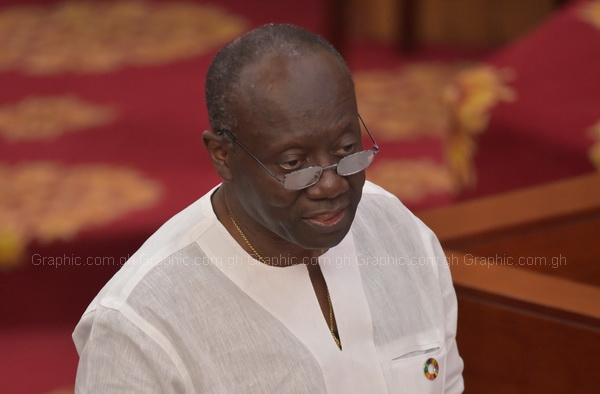
#Budget review: NHIL, GetFund become straight levies
The Minister of Finance, Mr Ken Ofori-Atta, swerved many Ghanaians yesterday when, contrary to expectations that the Value Added Tax (VAT) rate would be increased in the mid-year budget review, the review rather focused on other taxes to ensure that the government stayed on course with the year-end target of the 2018 budget.
In the build-up to the presentation of the mid-year budget review, several groups, including the Minority in Parliament, civil society groups and some business associations, had stood up against what they perceived to be an attempt by the government to raise the VAT rate from 17.5 to 21.5 per cent.
But, in the presentation of the review in Parliament on Thursday, Mr Ofori-Atta, whose appearance in the House had initially been met with some heckling by the Minority, ended up “silencing” the Minority by not raising VAT but introducing new measures to raise an additional GH¢1.35 billion in a bid to meet the fiscal deficit target of 4.5 per cent by the end of the year and pave the way for a successful exit from the International Monetary Fund (IMF) programme.
Measures
The new measures include the conversion of the National Health Insurance Levy (NHIL) of 2.5 per cent to a straight levy of 2.5 per cent; conversion of the GETFund VAT rate of 2.5 per cent to a straight levy of 2.5 per cent and the review of personal income tax to include an additional band of GH¢10,000 and above per month at a rate of 35 per cent.
Others are the imposition of luxury vehicle tax on vehicles with capacity of 3.0 litres and above and the intensification of tax compliance measures.
With revenue underperforming in the first five months of the year, the government narrowly missed its deficit target of 2.4 per cent, recording a budget deficit of 2.6 per cent, which has prompted the need for additional measures to ensure it stays on course with the year-end target.
A confident-looking Mr Ofori-Atta told the House: “As part of efforts to improve revenue performance, we will intensify tax compliance and plug existing revenue leakages.
“Investigations we have undertaken show in-bound leakages on goods arriving in the country, significant outstanding tax debts, suspense regimes in the area of warehousing, transit trade and free zones and tax audit issues such as limited coverage, low auditor productivity and low audit yields,” he stated,
He disclosed that the government was rolling out major initiatives to address those tax compliance issues, including the prosecution of tax evaders and corrupt tax officials, a special VAT task force to ensure enforcement and deepen VAT penetration from the current low levels of 11 per cent and institutional reforms at the Ghana Revenue Authority (GRA).
Revenue performance
Provisional data for the first five months of the year indicate that total revenue and grants amounted to GH¢17,384.7 million, representing 7.2 per cent of GDP, as against a programmed target of GH¢18,813.5 million.
That represented a shortfall of 7.6 per cent.
Of the provisional outturn for total revenue and grants, non-oil tax revenue accounted for 73.7 per cent, petroleum receipts from upstream petroleum activities accounted for 12.1 per cent, non-oil non-tax revenue accounted for 7.7 per cent, receipts from energy sector levies accounted for 2.9 per cent, grants accounted for 2.2 per cent, while SSNIT contribution to NHIL contributed 1.4 per cent.
The outturn for three of the main sources of revenue, namely, petroleum receipts, SSNIT contribution to NHIL and grants, was above target, while the outturn for non-oil tax revenue, non-oil non-tax revenue and Energy Sector Levies was below their respective targets.
![]()
Expenditure
Total expenditure, including the clearance of arrears, also fell below its target and amounted to GH¢23.75 billion, against a target of GH¢24.55 billion.
That resulted in a fiscal deficit on cash basis of GH¢6,371.8 million, representing 2.6 per cent of GDP, against a target of GH¢5,739.5 billion, representing 2.4 per cent of GDP.
Revisions
Due to revenues falling short in the first five months, the minister reviewed the revenue and expenditure outlook that was captured in the main 2018 budget.
The revenue target was revised from GH¢51.03 billion to GH¢50.68 billion, representing a decrease of 0.7 per cent.
Mr Ofori-Atta, however, pointed out that the achievement of that revised revenue estimate of GH¢50.686.2 million was contingent on the approval of its proposed revenue measures by Parliament.
“The key revisions to revenues are occasioned mainly by the proposed new tax measures, enhanced tax compliance, as well as expected non-materialisation of some revenues, such as property taxes and yield from the capping of MDAs’ IGFs,” he said.
Total expenditure (including arrears clearance) was also revised downwards from GH¢62 billion to GH¢61.6 billion.
Developments in public debt
The gross public debt stock in nominal terms stood at GH¢154 billion (US$32 billion) as of the end of May 2018, representing 63.8 per cent of GDP, compared to 66.8 per cent in the same period in 2017.
Of the total public debt, external debt as of the end of May 2018 amounted to GH¢81.7 billion (US$18.5 billion), whereas domestic debt amounted to GH¢72.6 billion (US$16.4 billion), representing 53 per cent and 47 per cent of the total public debt stock, respectively.
As a percentage of GDP, external and domestic debts represented 33.8 and 30 per cent, respectively.
